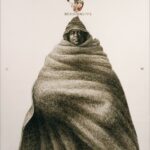I have met them at close of day
Coming with vivid faces
From counter or desk among grey
Eighteenth-century houses.
I have passed with a nod of the head
Or polite meaningless words,
Or have lingered awhile and said
Polite meaningless words,
And thought before I had done
Of a mocking tale or a gibe
To please a companion
Around the fire at the club,
Being certain that they and I
But lived where motley is worn:
All changed, changed utterly:
A terrible beauty is born.
Yeats wrote “Easter, 1916” between May and September of that year, directly in the aftermath of the Easter Rising rebellion that April. The poem’s form marries the traditional — rhythm, rhyme, and allegory among grey / Eighteenth-century houses — with the newly modernist around the fire at the club.
That woman’s days were spent
In ignorant good will,
Her nights in argument
Until her voice grew shrill.
What voice more sweet than hers
When young and beautiful,
She rode to harriers?
This man had kept a school
And rode our winged horse.
This other his helper and friend
Was coming into his force;
He might have won fame in the end,
So sensitive his nature seemed,
So daring and sweet his thought.
This other man I had dreamed
A drunken, vain-glorious lout.
He had done most bitter wrong
To some who are near my heart,
Yet I number him in the song;
He, too, has resigned his part
In the casual comedy;
He, too, has been changed in his turn,
Transformed utterly:
A terrible beauty is born.
In the second stanza, Yeats invokes the characters of key figures in the uprising: first his longtime friend, the suffragist Countess Markievicz; the teacher Patrick Pearse and “his helper and friend” Thomas MacDonagh; Major John MacBride, a “drunken, vain-glorious lout” and the estranged, possibly abusive husband of Yeat’s object of adoration Maud Gonne, whose beauty had attracted Yeats even while her radical zeal repulsed him. But even MacBridge is “number[ed]… in the song all the same,” Yeats writes. He, too has been changed in his turn.
Hearts with one purpose alone
Through summer and winter seem
Enchanted to a stone
To trouble the living stream.
The horse that comes from the road,
The rider, the birds that range
From cloud to tumbling cloud,
Minute by minute change;
A shadow of cloud on the stream
Changes minute by minute;
A horse-hoof slides on the brim,
And a horse plashes within it
Where long-legged moor-hens dive,
And hens to moor-cocks call.
Minute by minute they live:
The stone’s in the midst of all.
In the third stanza, Yeats himself — or his narrator — disappears. Famously politically reluctant, Yeats here focuses on the eternal, even as it “changes minute by minute.” Only one symbol Yeats invokes does not “minute by minute change”: the stone’s in the midst of all. The steadfast stone of purpose, to which the revolutionaries’ determined hearts are enchanted, “trouble[s] the living stream” of complacency in everyday life. For the source of the stone heart, the reader need look no further than the poem’s very next stanza:
Too long a sacrifice
Can make a stone of the heart.
O when may it suffice?
That is heaven’s part, our part
To murmur name upon name,
As a mother names her child
When sleep at last has come
On limbs that had run wild.
What is it but nightfall?
No, no, not night but death;
Was it needless death after all?
For England may keep faith
For all that is done and said.
We know their dream; enough
To know they dreamed and are dead.
And what if excess of love
Bewildered them till they died?
I write it out in a verse—
MacDonagh and MacBride
And Connolly and Pearse
Now and in time to be,
Wherever green is worn,
Are changed, changed utterly:
A terrible beauty is born.
Yeats famously despised the popular politicization of the traditional Irish green, going so far as to forbid publishers to bind his books in the color, a sentiment reflective of Yeats’ personal brad of nationalism, one bred from literary Romanticism as opposed to insurrectionary politics. Yet even the politically reluctant poet could overlook his own feelings in eulogizing the executed revolutionaries after too long a sacrifice (a phrase Mildred Downey Broxon would later borrow for her 1981 novel inspired by Irish mythology). But when may it suffice? Shakespeare might know: the decree that is heaven’s part alludes to Gertrude’s guilt in Hamlet, Act I, scene 5 — Against thy mother aught: leave her to heaven. Our part — those of us still on earth — is to remember the dead, To murmur name upon name, / As a mother names her child / When sleep at last has come / On limbs that had run wild.
In the earliest days of his writing career Yeats’ nationalist tendencies found expression only in folk tales and plays dealing in Ireland’s mythic past, never its troubled present. Only in 1913, when Pound published his Imagist manifesto and began working as Yeats’ secretary, did the older poet begin to widen his worldview and accept the political as the personal. Romantic Ireland’s dead and gone, / It’s with O’Leary in the grave, he wrote in one of his first explicitly political poems, “September 1, 1913.” Three years later, Yeats would deem that poem “old-fashioned” and begin work on “Easter, 1916.”
No longer hesitant to engage his art politically, Yeats steps into a new role: the poet of dialectics. Even as he claims to see the world exactly as it is from the vantage point of an impartial observer, removed from the fray, the force powering the poem is Yeats’ recognition of his own shortsightedness. Hearts with one purpose alone — troubling the stream — all changed in turn as a terrible beauty is born.




Leave a Reply